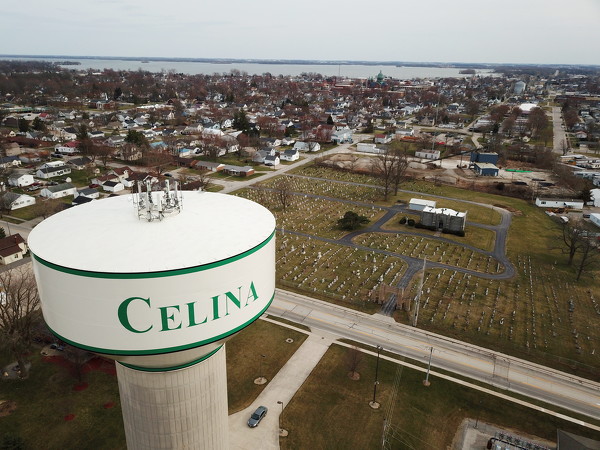Tuesday, March 30th, 2021
T-Mobile makes a major move
Communication giant goes to top of water tower
By William Kincaid

Photo by Ryan Snyder/The Daily Standard
T-Mobile plans to use the Celina water tower on Summit Street on the northwest side of the city to expand its communication coverage. T-Mobile officials want extra space in the base of the tower for their equipment.
CELINA - T-Mobile is expanding its communication coverage in the area using the city of Celina's Summit Street water tower. As such, officials have requested additional space inside the tower to place their equipment.
"Sprint is already on it but as you may or may not be aware, Sprint was acquired by T-Mobile. April of last year is when it closed," T-Mobile agent Derek McGrew told city council members last week. "So basically what's happening is we're looking to add the T-Mobile overage into overlapping onto the water tank."
Eventually the Sprint coverage would go away, leaving just T-Mobile, McGrew said.
The company wants to increase its footprint within the base of the water tower from 80 square feet to 94.5 square feet to install two cabinets containing communication equipment, city officials said.
However, company representatives don't feel they should have to pay any more money for the lease since the space they are requesting is so small.
"Council has authorized leases over the years on top of the water towers for different folks because of it being the highest point," mayor Jeff Hazel told councilors at a committee meeting. "So we have allowed different leases by different entities and T-Mobile being one of them, so I think this is an area where they're wanting to modify (the agreement)."
City officials on Dec. 4, 2007, signed a five-year lease agreement with Bright Personal Communications LLC to place its communication equipment in the water tower. The agreement contains four additional five-year terms that renew automatically through 2028, according to city law director George Moore.
"The current company is effectively T-Mobile. They've inherited this from at least one other entity," Moore said, adding that the lease holder pays the city $1,000 monthly.
T-Mobile representative Mike Gehrke emailed the city in February indicating the company inherited a very small lease area from Bright Personal Communications of 80 square feet that officials tried to work with as best they could, Moore said.
The company requested an additional 14.5 square feet of space but does "not believe that the very small increase in ground space for a maintenance project should be a reason for an increased rent."
"If there had been typical space available, the increased space would not be required," Moore read from the email.
Moore balked at the request.
"Normally you kind of pay by the square foot," Moore said. "What they had essentially thrown over to us is they want something from us without us basically getting anything from them."
Moore also took issue with T-Mobile's request to attach new language to the agreement pertaining to the lease's transfer, believing it's too restrictive.
"How does this benefit the city?" councilman June Scott asked. "It's detrimental to the city."
In response to councilman Eric Clausen, city safety service director Tom Hitchcock said various city officials store records within the base of the water tower.
"We benefit from them giving us money to use that space - and that's OK," Scott said. "But we're also going to benefit if we don't rent that space out. It's not as lucrative financially but it's still something that we can use."
Councilman Eric Baltzell said water tower space should be leased in the same fashion as office or building space.
"To me, we counter with, 'No, you're not going to have a zero increase. You're gaining space, we should get something for that,'" he said.
As the lease stands now, the company is paying $12.50 per square foot, Baltzell said. It should be assessed the same rate for any additional square feet, he reasoned. So at 94.5 square feet, T-Mobile should pay the city $1,181.25 a month. Other councilors agreed and utility committee members recommended that city administrators convey the request to company officials.
They didn't have to wait long to transmit that message, though, as T-Mobile agent McGrew attended the regular council meeting held immediately after the commitee meeting.
McGrew said the additional space would allow for two more cabinets to be arranged in a way where the doors could be opened and closed and the equipment accessed easily.
"The short answer is we feel like we should have had more space to begin with and what we're asking for is such a small amount of space," he said.
He also touched upon T-Mobile's plans for the area.
"T-Mobile likes the location, Sprint is already there and T-Mobile wants to expand their coverage in that location because Sprint has an existing lease there," McGrew said.
Councilors then relayed their terms for a renegotiated contract - the new monthly cost of $1,181.25 and the removal of restrictive language relating to a potential lease transfer.
McGrew indicated he was amenable to clarifying the language in question, saying the intent is merely to protect T-Mobile against predatory companies.
Some companies, McGrew said, are exclusively in the business of buying and selling tower leases, using their industry expertise and "tricks of the trade," to make more money.
"I would be surprised if you haven't already been contacted by somebody over the years for a company to buy out your leases. I'd be almost shocked," McGrew said.
Hazel said city officials have probably been contacted about such requests in the past but made clear they would not even remotely entertain selling off a lease agreement.
"We're not in it to try to barter and sell and trade. That's not a governmental operation," Hazel insisted. "That isn't going to happen for us to sell out a lease."
Aside from the committee's recommendation, no other formal action was taken. Councilors will meet again at 7 p.m. April 12 in council chambers on the second floor of the city administration building.



